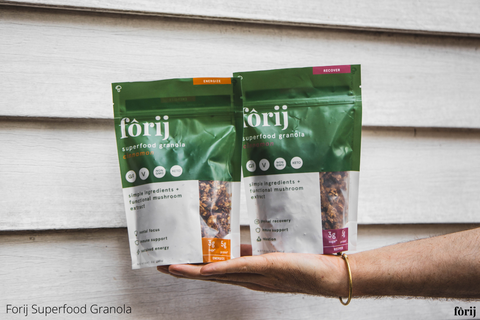What are the health benefits of lion’s mane?
What are the negative effects of lion’s mane?
How can you take lion’s mane?
Want to learn more about this amazing fungus? Check out our in-depth guide to lion’s mane mushrooms.
Health Benefits of Lion’s Mane—A Look at Lion’s Mane Studies
While the research on the many potential health benefits of lion’s mane is in its infancy, the studies published on the topic are promising. This mushroom species is among the healthiest mushrooms you can consume to maintain your health and prevent illnesses.
These adaptogenic mushrooms seem to benefit the brain, the digestive system, and the immune system, as well as help your body fight cancer and various autoimmune diseases. From an evidence based perspective, lion’s mane mushrooms have incredible potential and should be investigated further.
1. Neurological Health Benefits of Lion’s Mane
A 2023 study done at the University of Queensland Brain Institute confirmed these findings and concluded that “the lion’s mane mushroom had a significant impact on the growth of brain cells.” We explain the neurogenetic potential of this mushroom further in a blog post on lion’s mane and nerve growth; check it out to learn more.
Lion’s Mane for Dementia and Alzheimer’s Disease
Due to its beneficial effects on nerve growth and regeneration, lion’s mane appears to slow down the progression of dementia and dementia-related conditions.
Preclinical trials have successfully demonstrated that extracts and bioactive compounds of Hericium erinaceus have potential beneficial effects in ameliorating cognitive functioning and behavioral deficits in animal models of Alzheimer’s disease.—(Yanshree, et. al.)
A 2016 animal study looked into the neuroprotective benefits of lion’s mane on mice with induced Alzheimer’s disease. The treated mice took less time than the placebo group to complete several cognitive tasks, such as a water maze. These results suggest that Hericium erinaceus significantly enhanced the test animals’ brain function.
The most prominent human study on Hericium erinaceus and dementia-related cognitive decline examined its effect on mild cognitive impairment. The double-blind, placebo-controlled study was performed on Japanese adults who had experienced a mild loss of cognitive functions due to age or underlying conditions.
The participants’ cognitive health improved significantly after taking lion’s mane for 16 weeks. This study concludes that lion’s mane mushrooms “possess anti-dementia activity in mouse model[s] of Alzheimer’s disease and people with mild cognitive impairment.”
To learn more about anti-dementia properties of this mushroom, read our blog post on the benefits of lion’s mane for Alzheimer’s disease.
Lion’s Mane for Parkinson’s Disease
A 2021 study cites that “Hericium erinaceus…may be important in…preventing the progression of neurodegenerative diseases such as Parkinson’s disease” thanks to its beneficial effects on traumatic brain injury and nerve cell growth and regeneration.
Another study looked into whether lion’s mane mushrooms could reduce the neurodegenerative process of Parkinson’s disease. According to the findings, erinacine A, a compound found in Hericium erinaceus, lowers neurotoxicity in the brains of mice with MPTP Parkinson’s disease. This study concluded that “Erinacine A may be a potentially valuable neuroprotective and therapeutic agent that could be used to improve pathological conditions and behavioral deficits during PD treatment”
Read our article on the benefits of lion’s mane for Parkinson’s disease if you want to learn more.
Lion’s Mane for Nervous System Injuries
According to several studies, lion’s mane appears to have protective properties against nerve system injuries. A 2020 study notes that “Hericium erinaceus triggers neurite outgrowth and regeneration of damaged nerves.”
A 2011 study indicated that consuming this fungus on a daily basis may induce neuron regeneration. The study found that “…daily oral administration…of H. erinaceus…could promote the regeneration of injured rat peroneal nerve[s] in the early stage of recovery.”
An in vitro experiment examined the mushrooms’ ability to influence the process of myelination (myelin production). Myelin is a layer that forms around nerves and protects them, which is why its production is integral for nerve health. This study concludes that lion’s mane extract promotes the normal development of brain cells and myelin.
2. Lion’s Mane Anti-Cancer Properties
Lion’s mane appears to slow down the progression of various types of cancer. Cerebrosides, compounds found in the fruiting bodies of Hericium erinaceus, show a promising ability to fight cancer. In particular, cerebroside E, a common lion’s mane compound, seems to aid in cancer treatment, according to an in vitro study.
Lion’s mane is among the few functional mushrooms that seem to cause cancer cell apoptosis. That means these mushrooms may protect against various cancer types, such as colon cancer and leukemia, by aiding the process of programmed death of cancer cells.
A study on the effects of lion’s mane on liver cancer found that “Hericium erinaceus polysaccharide has significant anti-tumor effect on transplanted Hepatoma-22 tumor in mice.”
Another study, published in 2021, examined the anti-cancer potential of lion’s mane on estrogen receptor-positive (ER+) breast cancer. This study concluded that lion’s mane could be a candidate for ER+ breast cancer treatment due to this mushroom’s apoptotic properties.
3. Lion’s Mane Mental Health Benefits
In addition to aiding in the treatment of cognitive impairments, lion’s mane has the potential to aid in mental health and ease symptoms of mental health disorders. Lion’s mane appears to alleviate ADHD, anxiety, depression, and may even help reduce the severity of OCD due to its calming properties.

Lion’s Mane for Depression and anxiety
Research shows that lion’s mane could aid in alleviating symptoms of depression and anxiety. A scientific paper on the effects of Hericium erinaceus on depression cites that “H. erinaceus may be a potential alternative medicine for the treatment of depression.” while another study concluded that lion’s mane shows promise as “a therapeutic for anxiety in anxiety disorders.”
A randomized clinical trial looked at the effects of the lion’s mane mushroom on various menopause symptoms, including depression and anxiety. Compared with the control group, participants who consumed lion’s mane for 4 weeks scored lower on tests that measure symptoms of depression.
Another study found that lion’s mane “can exert anxiolytic and antidepressant-like effects, possibly by enhancing adult hippocampal neurogenesis.”
To learn more about the anxiolytic potential on lion’s mane, read our blog post on taking lion’s mane for anxiety. Or, check out our article on lion’s mane and depression if you want to know more about improving your mood with Hericium erinaceus.
Lion’s Mane Spiritual Benefits
In ancient China, Shaolin monks used Hericium erinaceus in their daily practice to improve their focus. They believed it boosted their “Qi,” a supernatural, energizing life force.
Nowadays, people still use lion’s mane mushrooms to improve their mental and spiritual well-being. Whether you’d like to improve your focus and memory, or need a way to calm your mind, the healing properties of lion’s mane may help you get there.
To learn more about how lion’s mane can help you become the best version of yourself, read our guide to the spiritual benefits of lion’s mane.
4. Digestive Health Benefits of Lion’s Mane
Hericium erinaceus seems to have protective effects on the digestive system. Animal research examined the effects of this medicinal mushroom on the stomach, and the results show that lion’s mane was able to reduce the risk of ethanol-induced stomach ulcers in rats.
Recent research and centuries of use suggest that lion’s mane may have the same effects on inflammatory bowel diseases in humans. According to a 2016 study, “Hericium erinaceus…has a long history of usage in traditional Chinese medicine as a tonic for stomach disorders, ulcers and gastrointestinal ailments.”
A randomized, placebo-controlled trial investigated the effects of a mushroom extract on ulcerative colitis. The extract was made of several mushrooms, including Hericium erinaceus. The findings revealed that lion’s mane had a positive effect on ulcerative colitis. It was especially beneficial in mild to moderate cases, and for those who used medication in addition to the extract.
Although more human studies are needed, it can’t hurt to take a lion’s mane mushroom supplement preemptively if you have inflammatory bowel diseases. To learn more, take a look at our article on the digestive health benefits of lion’s mane.
5. Lion’s Mane Immunity Boosting Properties
Research suggests that lion’s mane mushrooms show potential when it comes to antioxidant activity and immunity boosting potential.
For example, a study examined the effects of lion’s mane on immune health in mice. Results show that the lion’s mane mushroom improved overall immune function in mice by boosting cell and humoral immunity.
Another study, published in 2017, concluded that “fungal protein from H. erinaceus could be used as a drug or functional food ingredient for immunotherapy because of its immunomodulatory activities.”
According to a 2022 study on lion’s mane and Candida albicans, Hericium erinaceus appears to alleviate symptoms of fungal infections, which are common in patients with weakened immune systems. This study found that Hericium erinaceus “reduced the damage of C. albicans to the visceral tissue of infected mice and improved the survival rate of mice.”
6. Anti-Diabetes Properties of Lion’s Mane Mushrooms
Lion’s mane appears to stabilize blood sugar levels, which is highly beneficial for people with diabetes. A 2020 study confirmed “the potential of H. erinaceus in the treatment of diabetes.” as five of its compounds demonstrated α-glucosidase inhibitory activities.
Polysaccharides, compounds found in Hericium erinaceus, contain anti-hyperglycemic properties, meaning they can lower blood sugar levels. This means that lion’s mane can be quite helpful for people with diabetes who need to keep their blood sugar levels from spiking too much after a meal.
A study on the effects of lion’s mane on rats with diabetes seems to confirm the anti-hyperglycemic potential of this mushroom. After 28 days on a lion’s mane extract, rats blood glucose levels stabilized.
Read our article on the benefits of lion’s mane for diabetes to learn more.
7. Heart Health Benefits of Lion’s Mane
Health conditions such as high blood pressure and blood clots can increase the risk of heart disease or a heart attack. Luckily, lion’s mane appears to aid in heart disease prevention.
A study on the effects of lion’s mane on platelet aggregation found that a compound found in Hericium erinaceus, “hericenone B, had a strong anti-platelet activity and it might be a novel compound for antithrombotic therapy.”
Lion’s mane also appears to reduce cholesterol levels. According to research, lion’s mane can decrease levels of low-density cholesterol (LDL), which is a common cause of multiple heart health issues, while increasing the levels of good cholesterol, called high-density cholesterol (HDL).
8. Antiinflammatory and Antioxidant Activities of Lion’s Mane
Studies suggest that lion’s mane can aid in reducing chronic inflammation and oxidative stress in the body, which could be beneficial for people with chronic inflammatory ailments, such as osteoarthritis, rheumatoid arthritis, and psoriatic arthritis.
A 2020 study found that two compounds present in this mushroom “showed moderate inhibitory effects indicating their potential anti-inflammatory activity, which may provide the basis for the traditional medical use of H. erincacus.”
Polysaccharides found in lion’s mane mushrooms also appear to reduce oxidative stress. A 2012 animal study found an increase in antioxidant enzymes in mice after only 15 days of consuming Hericium erinaceus polysaccharides (HEP). This study concluded that “HEP can significantly decrease lipid peroxidation level and increase antioxidant enzyme activities in experimental animals.”
To learn more about how lion’s mane reduces inflammation and oxidation in the body, read our blog post on antiinflammatory properties of Hericium erinaceus.
Lion’s Mane Mushroom Side Effects
There is no research or anecdotal evidence to suggest that consuming lion’s mane mushroom extract could be dangerous.
Hericium erinaceus has been used in traditional Chinese medicine for centuries and is still popular today, and only reported adverse effects to this mushroom seem to be an upset stomach and diarrhea.
Although these side effects are quite rare, you should start with a low dose of the mushroom in order to prevent digestive issues, especially if you’ve never used medicinal mushrooms before, as lion’s mane can have some contraindications.
Does Lion’s Mane Interact With Medications?
Although there is sparse research on the interactions of lion’s mane with prescription medications, the mushroom may have certain effects that could interfere with drugs for diabetes or blood clotting.
For one, lion’s mane appears to have antiplatelet effects. If you’re already on blood thinners, you may want to consult with a medical professional about a potential interaction in order to avoid symptoms such as prolonged wound healing and bruising.
An animal study on the effects of lion’s mane supplements on diabetic mice suggests that this adaptogenic mushroom has antihyperglycemic effects. Therefore, if you’re already on medication that lowers blood sugar levels, such as insulin, you should keep track of your blood sugar when taking lion’s mane to make sure it doesn’t dip below normal levels.
Is Lion’s Mane Addictive?
No, lion’s mane mushrooms are not addictive, even if you take them every day. Since it doesn’t have psychoactive effects, lion’s mane won’t cause a high, and you can stop taking it whenever you choose without any repercussions (although you’ll also stop reaping its benefits).
Interested in Trying Lion’s Mane Mushrooms?
Lion’s mane is generally safe for most people. If you want to incorporate the helpful fungus into your diet, you can do so with our mushroom granola.

The granola is vegan, gluten-free, packed with nutrients, and delicious. What more could you want in a morning bowl of cereal?
What Is the Ideal Lion’s Mane Dosage?
There is no ideal lion’s mane dosage for everyone and all health conditions. If you’re new to lion’s mane, start with a low to medium dosage of around 500 mg and gradually increase until you notice an improvement. Read our lion’s mane dosage guide for additional information on taking lion’s mane for specific health conditions.
How much lion’s mane is in AdaptogenShroomsgranola?
AdaptogenShroomsgranola uses a high-quality lion’s mane mushroom extract made from whole medicinal mushrooms. Our dual extraction method extracts both water-soluble beta-glucans as well as alcohol-soluble triterpenes. Our decoction process breaks down indigestible chitin cell walls of the mushroom to get much more of these compounds out than ordinary processes do.
One serving of our granola provides 250 mg of hyperconcentrated lion’s mane extract, which is eight times more concentrated than a regular lion’s mane supplement. Therefore, you get as much lion’s mane potency as you would if you were taking a 2000 mg mushroom powder supplement, all in one bowl of granola.
Lion’s Mane Mushroom Health Benefits FAQ
Can I take lion’s mane and reishi mushrooms together?
Yes, you can take lion’s mane mushrooms with any other type of medicinal fungus, including the reishi mushroom. When it comes to adaptogenic mushrooms, the whole is always greater than the sum of its parts. Therefore, the benefits of reishi can only be improved upon by taking them with lion’s mane mushrooms and vice versa.
Does lion’s mane make you happier?
Taking lion’s mane may make you feel calmer, more energized and focused, which can result in you feeling happier. Plus, this mushroom appears to alleviate symptoms of anxiety and depressive disorders and aid in stress-reduction, and a calmer brain is a happier brain.
Should I take lion’s mane in the morning or at night?
It’s best to take Hericium erinaceus in the morning or early afternoon, so you can reap the many lion’s mane mushroom benefits during your workday. Although you can take lion’s mane at night as well, do so with caution as it may make you restless and unable to fall asleep.
Can I take lion’s mane daily?
Yes, not only is it completely safe to take lion’s mane every day, doing so will allow you to reap the most benefits of this mushroom. Luckily, there are many ways to include lion’s mane into your wellness routine—you can use dry mushrooms in a dish or to make tea, go with lion’s mane in supplement form (such as lion’s mane mushroom capsules and mushroom powders), or opt for food infused with it (such as mushroom coffee or AdaptogenShroomsgranola).
What does lion’s mane do for the body?
Lion’s mane has an abundance of potential benefits for the body. Due to its high protein content and neurotrophic properties, many athletes use lion’s mane for weight management and the mind-muscle connection.
For additional information on the effects of this mushroom on the body, read our article on taking lion’s mane for weight loss, and the one on the benefits of Hericium erinaceus for bodybuilders.
What does lion’s mane do to the brain?
Lion’s mane is one of the best mushrooms for brain health. This mushroom is known for repairing nerve cells, alleviating symptoms of dementia, and reducing anxiety and depression. We have created a deep dive that goes into all the brain benefits of lion’s mane, read it to learn more.
How healthy is lion’s mane?
Medical reviewers and alternative medicine practitioners agree that lion’s mane is incredibly healthy. Hericium erinaceus boosts immune function, alleviates symptoms of various mental and physical conditions, and is safe to use, even for children. You can’t go wrong by incorporating lion’s mane into your health and wellness routine.
Does lion’s mane affect hormones?
Lion’s mane has the potential to affect hormones by stabilizing hormone production via its beneficial effects on nerve cell growth. This mechanism is likely behind the effects of lion’s mane on testosterone and estrogen, indicating that this mushroom could be a powerful agent in men’s and women’s health. Read our article on Hericium erinaceus and DHT production to learn more about lion’s mane and hormones.
Does lion’s mane help with brain fog?
Yes, studies show that lion’s mane can aid in brain fog relief. According to the findings of a 2018 study, these medicinal mushrooms relieved signs of depression, including brain fog, in adult mice by boosting nerve cell proliferation and brain regeneration. Many people with OCD use lion’s mane to control their symptoms because of its therapeutic effects on the brain.
Is lion’s mane a superfood?
Yes, lion’s mane is considered a superfood due to its impressive list of therapeutic benefits. People also refer to lion’s mane as a functional food, a nootropic, and an adaptogen.
What is the most beneficial way to take lion’s mane?
There are many beneficial ways to take lion’s mane, including cooking with it and consuming dietary supplements with Hericium erinaceus. If you want to reap these mushrooms’ benefits, choose a product with a high-quality extract made from the whole mushroom (like our granola).
What is the perfect lion’s mane dosage for depression?
There is no one-size-fits-all lion’s mane dosage for depression. While some people report taking 750-1000 mg everyday, others claim taking up to two spoonfuls of lion’s mane mushroom powder (about 5000 mg) to experience the mushroom’s relaxing effects. If you’re taking lion’s mane for depression, start with a lower dose (750 mg per day) and gradually increase.
What is the ideal lion’s mane dosage for neuropathy?
Lion’s mane mushrooms may alleviate neuropathic pain. To reap this benefit, take 500 mg or more of this functional mushroom per day. The precise dosage will vary from person to person, so you should experiment until you find the ideal dosage for you.
Resources
- Lai, P. L. (2013). Neurotrophic Properties of the Lion’s Mane Medicinal Mushroom, Hericium erinaceus (Higher Basidiomycetes) from Malaysia. International Journal of Medicinal Mushrooms, 15(6), 539–554. https://doi.org/10.1615/intjmedmushr.v15.i6.30
- Martínez‐Mármol, R. (2023). Hericerin derivatives activates a pan‐neurotrophic pathway in central hippocampal neurons converging to ERK1 /2 signaling enhancing spatial memory. Journal of Neurochemistry. https://doi.org/10.1111/jnc.15767
- Yanshree (2022). The Monkey Head Mushroom and Memory Enhancement in Alzheimer’s Disease. Cells, 11(15), 2284. https://doi.org/10.3390/cells11152284
- Zhang, J. (2016). The Neuroprotective Properties of Hericium erinaceus in Glutamate-Damaged Differentiated PC12 Cells and an Alzheimer’s Disease Mouse Model. International Journal of Molecular Sciences, 17(11), 1810. https://doi.org/10.3390/ijms17111810
- Mori, K. (2009). Improving effects of the mushroom Yamabushitake (Hericium erinaceus) on mild cognitive impairment: a double-blind placebo-controlled clinical trial. Phytotherapy Research, 23(3), 367–372. https://doi.org/10.1002/ptr.2634
- D’Amico, R. (2021). Hericium erinaceus and Coriolus versicolor Modulate Molecular and Biochemical Changes after Traumatic Brain Injury. Antioxidants, 10(6), 898. https://doi.org/10.3390/antiox10060898
- Lee, K. F. (2020). Post-Treatment with Erinacine A, a Derived Diterpenoid of H. erinaceus, Attenuates Neurotoxicity in MPTP Model of Parkinson’s Disease. Antioxidants, 9(2), 137. https://doi.org/10.3390/antiox9020137
- Wong, K. H. (2011). Peripheral Nerve Regeneration Following Crush Injury to Rat Peroneal Nerve by Aqueous Extract of Medicinal Mushroom Hericium erinaceus (Bull.: Fr) Pers. (Aphyllophoromycetideae). Evidence-Based Complementary and Alternative Medicine, 2011, 1–10. https://doi.org/10.1093/ecam/neq062
- Kolotushkina, E. V. (2003). The influence of Hericium erinaceus extract on myelination process in vitro. Fiziolohichnyi zhurnal (Kiev, Ukraine : 1994), 49(1), 38–45. https://pubmed.ncbi.nlm.nih.gov/12675022/
- Lee, S. R. (2015). A new cerebroside from the fruiting bodies of Hericium erinaceus and its applicability to cancer treatment. Bioorganic & Medicinal Chemistry Letters, 25(24), 5712–5715. https://doi.org/10.1016/j.bmcl.2015.10.092
- Liu, J. Y. (2020). Isolation and structural characterization of a novel polysaccharide from Hericium erinaceus fruiting bodies and its arrest of cell cycle at S-phage in colon cancer cells. International Journal of Biological Macromolecules, 157, 288–295. https://doi.org/10.1016/j.ijbiomac.2020.04.162
- Kim, S. P. (2011). Mechanism of Hericium erinaceus (Yamabushitake) mushroom-induced apoptosis of U937 human monocytic leukemia cells. Food & Function, 2(6), 348. https://doi.org/10.1039/c1fo10030k
- Peng, Y. (2012) Inhibitory Effect of Hericium erinaceus Polysaccharide on Hepatoma-22 (H22) Tumor Bearing Mice[J]. FOOD SCIENCE, 2012, 33(9): 244-246. https://www.spkx.net.cn/EN/10.7506/spkx1002-6630-201209051
- Atay, S. (2021). Transcriptome-Wide Analysis Reveals the Molecular Mechanism of Tumoricidal Effects of Lion’s Mane Medicinal Mushroom, Hericium erinaceus (Agaricomycetes), on MCF-7 Breast Cancer Cells. International Journal of Medicinal Mushrooms, 23(1), 91–106. https://doi.org/10.1615/intjmedmushrooms.2020037448
- Chong, P. S. (2019). Therapeutic Potential of Hericium erinaceus for Depressive Disorder. International Journal of Molecular Sciences, 21(1), 163. https://doi.org/10.3390/ijms21010163
- Rodriguez, M. N. (2022). Lion’s Mane (Hericium erinaceus) Exerts Anxiolytic Effects in the rTg4510 Tau Mouse Model. Behavioral Sciences, 12(7), 235. https://doi.org/10.3390/bs12070235
- Nagano, M. (2010). Reduction of depression and anxiety by 4 weeks Hericium erinaceus intake. Biomedical Research, 31(4), 231–237. https://doi.org/10.2220/biomedres.31.231
- Ryu, S. (2018). Hericium erinaceus Extract Reduces Anxiety and Depressive Behaviors by Promoting Hippocampal Neurogenesis in the Adult Mouse Brain. Journal of Medicinal Food, 21(2), 174–180. https://doi.org/10.1089/jmf.2017.4006
- Wong, J. Y. (2013). Gastroprotective Effects of Lion’s Mane Mushroom Hericium erinaceus (Bull.:Fr.) Pers. (Aphyllophoromycetideae) Extract against Ethanol-Induced Ulcer in Rats. Evidence-Based Complementary and Alternative Medicine, 2013, 1–9. https://doi.org/10.1155/2013/492976
- Lakshmanan, H. (2016). Haematological, biochemical and histopathological aspects of Hericium erinaceus ingestion in a rodent model: A sub-chronic toxicological assessment. Journal of Ethnopharmacology, 194, 1051–1059. https://doi.org/10.1016/j.jep.2016.10.084
- Therkelsen, S. P. (2016). Effect of a Medicinal Agaricus blazei Murill-Based Mushroom Extract, AndoSanTM, on Symptoms, Fatigue and Quality of Life in Patients with Ulcerative Colitis in a Randomized Single-Blinded Placebo Controlled Study. PLOS ONE, 11(3), e0150191. https://doi.org/10.1371/journal.pone.0150191
- Sheng, X. (2017). Immunomodulatory effects of Hericium erinaceus derived polysaccharides are mediated by intestinal immunology. Food & Function, 8(3), 1020–1027. https://doi.org/10.1039/c7fo00071e
- Diling, C. (2017). Immunomodulatory Activities of a Fungal Protein Extracted from Hericium erinaceus through Regulating the Gut Microbiota. Frontiers in Immunology, 8. https://doi.org/10.3389/fimmu.2017.00666
- Qian, Z. (2022). Natural Compound 2-Chloro-1,3-dimethoxy-5-methylbenzene, Isolated from Hericium Erinaceus, Inhibits Fungal Growth by Disrupting Membranes and Triggering Apoptosis. Journal of Agricultural and Food Chemistry, 70(21), 6444–6454. https://doi.org/10.1021/acs.jafc.2c01417
- Chen, B. (2020). Identification and α-Glucosidase Inhibitory Activity of Meroterpenoids from Hericium erinaceus. Planta Medica, 86(08), 571–578. https://doi.org/10.1055/a-1146-8369
- He, X. (2017). Structures, biological activities, and industrial applications of the polysaccharides from Hericium erinaceus (Lion’s Mane) mushroom: A review. International Journal of Biological Macromolecules, 97, 228–237. https://doi.org/10.1016/j.ijbiomac.2017.01.040
- Liang, B. (2013). Antihyperglycemic and antihyperlipidemic activities of aqueous extract of Hericium erinaceus in experimental diabetic rats. BMC Complementary and Alternative Medicine, 13(1). https://doi.org/10.1186/1472-6882-13-253
- Mori, K. (2010). Inhibitory effect of hericenone B from Hericium erinaceus on collagen-induced platelet aggregation. Phytomedicine, 17(14), 1082–1085. https://doi.org/10.1016/j.phymed.2010.05.004
- Choi, W. S. (2013). Hypolipidaemic Effect of Hericium erinaceum Grown in Artemisia capillaris on Obese Rats. Mycobiology, 41(2), 94–99. https://doi.org/10.5941/MYCO.2013.41.2.94
- Xie, G. (2022). Secondary Metabolites from Hericium erinaceus and Their Anti-Inflammatory Activities. Molecules (Basel, Switzerland), 27(7), 2157. https://doi.org/10.3390/molecules27072157
- Han, Z. H. (2013). Evaluation of in vivo antioxidant activity of Hericium erinaceus polysaccharides. International journal of biological macromolecules, 52, 66–71. https://doi.org/10.1016/j.ijbiomac.2012.09.009
AdaptogenShroomsDisclaimer
ABOUT THE AUTHOR
Mushy is your mentor in the enchanting world of adaptogenic mushrooms. An expert in mycology and holistic medicine, he fuses contemporary science with traditional wisdom to lift the veil on the benefits of mushrooms for health and well-being. With an informed, science-based approach, Mushy guides you through the mysterious world of mushrooms that strengthen the balance and resilience of body and mind. Whether you’re a curious neophyte or a seasoned explorer of medicinal mushrooms, Mushy is your ally in the quest for a more harmonious and energetic life.







